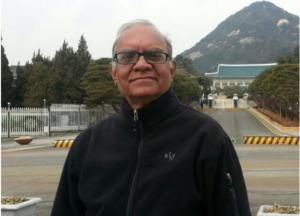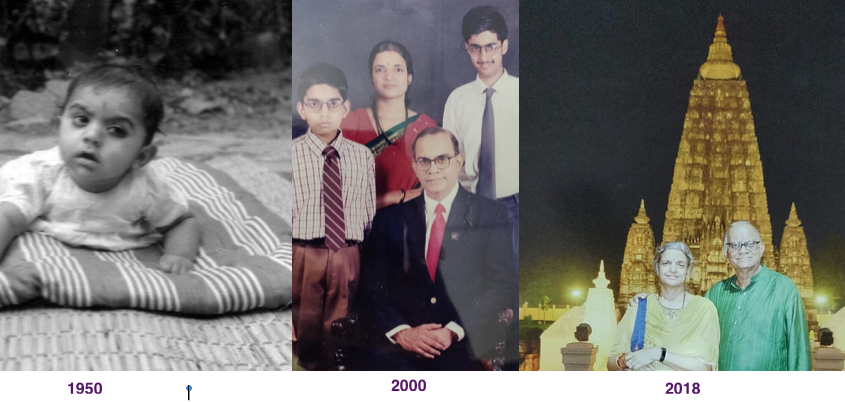Growth & Change
Behind every successful man, there is a surprised woman.
But behind every happy man, there are many silent women.
In the 21st century, driven by technology with a growing number of gratification-seekers, understanding oneself in terms of one’s potential and limitations to lead a happy and fulfilling life is increasingly becoming complex. While we can observe or experience the changes happening around us and realize the necessity to modify ourselves, as we grow older, adapting to change becomes more difficult.
Born in a middle-class, not-so-conservative family living in the then beautiful Bangalore, around the time when India became a full-fledged Republic[1], growing up was easy and fun-filled. My mother tells me that when she was relaxing after lunch in the main hall of our ancestral house, on a cosy afternoon towards the end of July, I popped out of her, as if in a tearing hurry to see how the real world looks like. She also tells me that no one was around at that time except Lord Venkateshwara2 in the form of an antique Tanjore painting above her head. My parents already had two daughters by that time and both were born at my maternal grandmother’s home in Mysore.
After turning four, apparently I started pestering my father to admit me to a school because both my elder sisters were going to school. There was a small primary school seven buildings away from my home and it was easy for my father to take a decision to admit me there. As I recall, I carried only a slate and a slate-pencil to school, came home for lunch, took a nice little nap, and went back to school in the afternoon. This went on smoothly for nearly two years, when the first major change happened. My father who was employed with Military Engineering Services (MES) got transferred to Kadakavasala3 in 1957, where the National Defence Academy (NDA) was then coming up. All of us had to shift with him as he could not maintain family at two different places.
By this time two of my younger siblings, a boy (1953) and a girl (1955) had been born and my eldest sister was identified with Type-A Diabetes. With limited resources and lack of medical facilities, she could not be saved. On 12th July 1957, before her twelfth birthday, she breathed her last at the small 1-BHK house allotted to my father at Kadakavasala, where we had moved in just a month before. That was the first major event that impacted me during my early growing years and prepared me to look at the world in a different manner.
Khadakavasala had only a Marathi medium school and my father could not admit us there. In January 1958 my father’s cousin was getting married in Madras (now Chennai). My grandmother was the eldest in her family and so her brother wanted her to be present for the wedding. To reduce some of the burden on my parents, my grandmother decided to take my elder sister and me along with her to attend the wedding.
After we attended the wedding, we moved to Coonoor, where my father’s brother-in-law had bought a bungalow with a tea estate a couple of years earlier. Two of my paternal cousins (26 and 24 years) – both bachelors and their father’s uncle, who was over eighty, were living there. My sister and I spent an enjoyable time in the gardens and estate with gardeners, their families and children apart from reading a few books and doing a few odd jobs to help the elders. One academic year (1957-58) was spent without attending school.
In May 1958 my eldest cousin on my father’s side (my father had only one sibling, an elder sister) was getting married in Madras and so we went there. My parents with my younger siblings also joined us. At the wedding, a cousin of my father casually enquired, “What are the children doing?” There was no school in Coonoor, so my aunt requested him to admit my sister and me in a school in Madras close to his house. We spent one academic year (1958-59) in Madras. With the blistering heat and lack of hygiene, I had eczema all over my body. We were packed off back to Coonoor. My grandmother ensured that I got some herbal treatment and was cured of eczema. Again we had to spend a year (1959-60) without schooling. However, during my childhood days, those couple of years, through travel and staying with relatives exposed me to different types of people and situations which made me understand how my wise grandmother provided us silent support. It is during these formative years, concepts of Karma and duty got seeded in my mind.
We returned to Bangalore in April 1960 and back to our ancestral home by the end of May. By this time, I was admitted to fourth standard in a nearby school and my sister to sixth standard. My mother and my younger siblings, who were seven and five by then, also joined us and they too were admitted to school. It was like a new birth all over again! We all started living together again as one family after a break of three years.
[1] India became a Republic on 26th January 1950
[2] Venkateshwara is one of the forms of Lord Vishnu
[3] Khadakavasala is 14 kilometers from Pune, Maharashtra
October 2018 | Ravi 01


